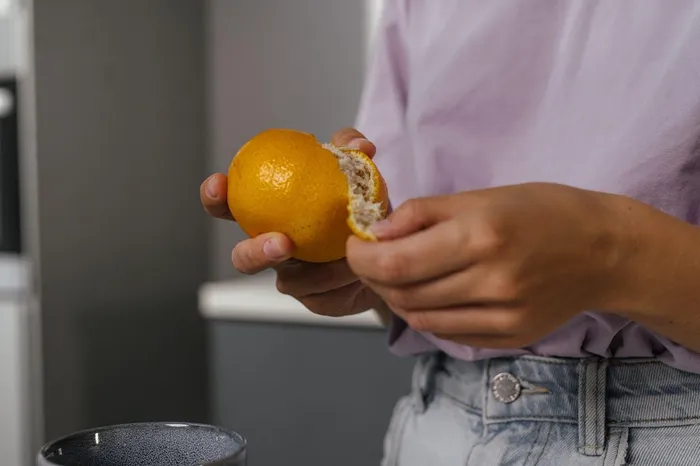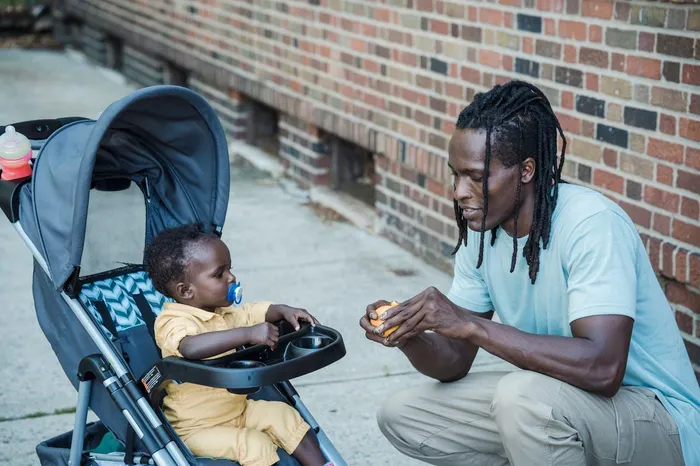
The Orange Peel Theory suggests that the small, everyday acts we do for our partners like peeling an orange can mean far more than big romantic gestures.
Image: SHVETS production /pexels
Scrolling through TikTok lately, you might have come across videos about the "Orange Peel Theory". At first glance, it sounds oddly specific. Why is peeling an orange suddenly a relationship trend?
But the idea behind it is as sweet and thoughtful as it sounds, and it’s making many people rethink what love truly looks like.
The Orange Peel Theory suggests that the small, everyday acts we do for our partners, like peeling an orange, can mean far more than big romantic gestures.
Not because someone can’t peel their own orange, but because it shows care, thoughtfulness, and the kind of gentle attention that makes us feel safe and loved.
While you won’t find the “orange peel theory” in any psychology textbook, the conversation it sparked is deeply rooted in relationship science.
Clinical psychologist and applied neuroscientist Dr Kate Truitt explains that these micro-moments of kindness help build a foundation of trust and emotional security in a relationship.
“The truth is, it’s the small acts that create a sense of security and connection for long-term relationship success,” she says.
Love is in the details; think about your own life for a moment. Has someone ever made you a cup of tea on a stressful morning? Sent a simple text just to say “I’m thinking of you”?
Or yes, even peeled an orange for you because you were busy typing an email? These little things might seem small, but they remind us: You matter. I see you.
Relationship coach Esther Perel, known for her TED Talks and bestselling books, has long championed this idea, too. In her podcast, " Where Should We Begin?", Perel often reminds couples that intimacy lives in “the micro-moments” the shared looks, the unspoken gestures, the ordinary acts that say I see you.
Relationship experts often talk about how intimacy lives in the everyday.
According to Perel, it’s less about candlelit dinners in Paris and more about turning toward each other in small moments, asking how your partner’s day was, noticing when they’re tired, and helping out in ways that show, “I’ve got you.”
Research backs this up, too. A 2021 study published in the "Journal of Social and Personal Relationships" found that small daily acts of kindness and affection were strongly linked to relationship satisfaction and longevity.
Couples who consistently show each other small kindnesses feel closer, argue less, and recover faster from disagreements.
These micro-acts, experts say, create a sense of “felt security”, the comforting belief that your partner is there for you, even when life feels unpredictable.
And it’s that everyday security, rather than occasional grand gestures, that keeps love alive over the years. Of course, peeling an orange isn’t the only way to practice this.
Maybe it’s making your partner’s coffee the way they like it, offering to drive when they’re tired, or remembering to buy their favourite snack on your grocery run.
What matters isn’t the act itself, it’s the intention behind it. It’s about saying: “I notice you. I care enough to make your day a little easier.” And the beautiful thing is that these small acts of love often inspire reciprocity.
When someone feels cared for, they’re more likely to show care in return, creating a gentle, ongoing exchange of love and kindness.
Dr Hong Yin, psychiatrist at New Frontiers Psychiatry & TMS, cautions against reading too much into a single orange peel (or lack thereof): “How we show love is complex and context matters. The orange peel is just one sample point. But what matters is the spirit behind these acts: kindness, empathy, and the willingness to tune in to each other’s needs.”
Kindness creates empathy. Empathy builds trust. And trust is the foundation of any lasting relationship. Sometimes, it’s as simple as listening when your partner has a bad day, validating their feelings, or just making the bed when it’s their turn.
Even non-verbal cues a warm glance, a squeeze of the hand, can be surprisingly therapeutic.
“When we help, we give our partners a chance to recharge and reciprocate, Yin explains. That balance is the bedrock of a fulfilling relationship.”

Micro-moments of kindness help build a foundation of trust and emotional security in a relationship
Image: Sasha Kim /pexels
That’s not to say grand gestures don’t matter. Surprising your partner with flowers, planning a special trip, or writing a heartfelt letter can deepen the connection, too.
However, as Truitt explains, if those big gestures aren’t backed by everyday acts of love, they can feel empty or performative.
“It’s the combination that counts,” she says. “But it’s the daily moments like peeling an orange that truly anchor love in daily life.”
When I first encountered the Orange Peel Theory, I found it amusing. Could peeling an orange really encapsulate deep emotional connections?
However, my reflections soon shifted as I thought about the subtle ways I've experienced love: friends surprising me with my favourite biltong and cake, my mother couriering warm socks during winter or the fact that my little human stays up late to keep me company while I finish writing.
These were the moments that made me feel most loved. Not because I couldn’t do those things myself, but because someone chose to show up in a gentle, thoughtful way.
Related Topics: